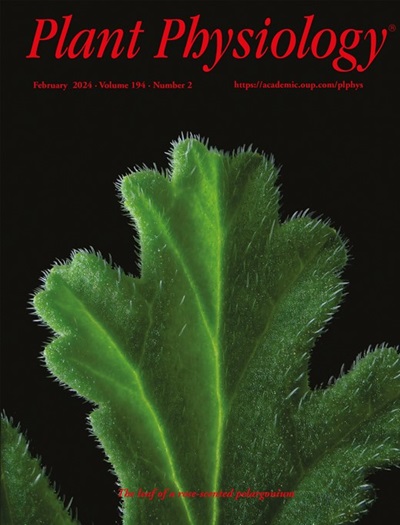天然的Msc-4等位基因通过保守和分化的基因调控机制赋予辣椒基因雄性不育性。
IF 6.9
1区 生物学
Q1 PLANT SCIENCES
引用次数: 0
摘要
基因雄性不育(GMS)的利用大大降低了生产成本,并保证了杂交种子的高品种纯度,因此在辣椒(Capsicum annuum)杂交种子生产中显示出相当大的潜力。在这项研究中,我们报道了一个辣椒GMS突变体,中国-4雄性不育(msc-4)的特征,该突变体表现为花粉粒流产而没有检测到外周。引人注目的是,这些辣椒的营养生长没有受到影响。基于基因组的定位和功能分析表明,细胞色素P450家族基因CYP703A2/ msc-4的无意义突变导致花粉发育失败和随后的GMS。Msc-4转录本特异地在发育中的花药绒毡层和小孢子中积累。比较转录组分析表明,脂肪酸和孢粉素代谢在msc-4突变体中严重受损。此外,我们证明了AMS-MYB80-CYP703A2/Msc-4调控级联在辣椒中通常是保守的,尽管存在一些差异。重要的是,番茄和黄瓜CYP703A2同源基因的突变使雄性不育而不影响生长,这有力地支持了CYP703A2基因是产生GMS种质的理想目标。总的来说,我们的研究结果揭示了辣椒中Msc-4的分子基础,表明CYP703A2基因的突变可以很容易地适应于广泛的蔬菜作物。本文章由计算机程序翻译,如有差异,请以英文原文为准。
The natural Msc-4 allele confers genic male sterility via conserved and divergent gene regulatory mechanisms in pepper.
Utilization of genic male sterility (GMS) significantly reduces production costs and ensures the high varietal purity of hybrid seeds, thereby demonstrating considerable potential for hybrid seed production in pepper (Capsicum annuum). In this study, we report the characterization of a pepper GMS mutant, male sterility from China-4 (msc-4), which exhibits aborted pollen grains without detectable exine. Strikingly, the vegetative growth of these pepper plants was unaffected. Genome-based mapping and functional analysis of msc-4 revealed that a nonsense mutation in a cytochrome P450 family gene, CYP703A2/Msc-4, results in pollen development failure and subsequent GMS. Msc-4 transcripts specifically accumulated in the tapetum and microspores of developing anthers. Comparative transcriptome analysis suggested that fatty acid and sporopollenin metabolism are severely impaired in msc-4 mutants. Furthermore, we demonstrated that the AMS-MYB80-CYP703A2/Msc-4 regulatory cascade is generally conserved, albeit with some differences, in pepper. Importantly, mutations in the tomato and cucumber CYP703A2 orthologs conferred male sterility without growth penalty, strongly supporting that CYP703A2 genes are ideal targets for the generation of GMS germplasms. Overall, our findings shed light on the molecular basis of Msc-4 in pepper, demonstrating that mutagenesis of CYP703A2 genes can be readily adapted for a broad range of vegetable crops.
求助全文
通过发布文献求助,成功后即可免费获取论文全文。
去求助
来源期刊

Plant Physiology
生物-植物科学
CiteScore
12.20
自引率
5.40%
发文量
535
审稿时长
2.3 months
期刊介绍:
Plant Physiology® is a distinguished and highly respected journal with a rich history dating back to its establishment in 1926. It stands as a leading international publication in the field of plant biology, covering a comprehensive range of topics from the molecular and structural aspects of plant life to systems biology and ecophysiology. Recognized as the most highly cited journal in plant sciences, Plant Physiology® is a testament to its commitment to excellence and the dissemination of groundbreaking research.
As the official publication of the American Society of Plant Biologists, Plant Physiology® upholds rigorous peer-review standards, ensuring that the scientific community receives the highest quality research. The journal releases 12 issues annually, providing a steady stream of new findings and insights to its readership.
 求助内容:
求助内容: 应助结果提醒方式:
应助结果提醒方式:


